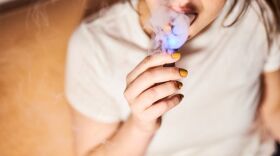
Susie Neilson
-
In response to the March shootings that left 51 people dead, the nation's gun buyback program asks owners of now-banned weapons to turn them in to police departments for cash.
-
Ever since astronaut John Glenn's first bite of applesauce in 1962, eating in space has been a challenge. NPR talks to former NASA food scientists to see how cosmic cuisine has evolved over the years.
-
Even well-intended comments about weight and dieting can actually harm children. Here's advice for how to set kids up for a healthy life and a positive self-image.
-
The startup Mahmee hopes to help OB-GYNs, pediatricians and other health providers closely monitor a mother and baby's health so that any red flags can be assessed before they become life-threatening.
-
People with drug-resistant tuberculosis take many pills over a long period of time. Cure rate is low. The FDA has now approved a drug with great promise. But Doctors Without Borders has concerns.
-
The government asked manufacturers to complete safety studies on the active ingredients in sunscreens by November. In the meantime, what do you need to know about the goo you slather on your skin?
-
Following shootings at two store locations, Walmart said in an internal memo that it would take down all imagery and stop playing videos that depicted violence.
-
An engineer has invented a new way to test for the presence of cholera bacterium in water. The test could be useful in remote areas, because it's lightweight and self-contained.
-
New research suggests allergies to sesame are comparably prevalent as those to some tree nuts. The findings come as the FDA weighs whether to require sesame to be listed as an allergen on food labels.
-
Among the possibly harmful compounds are "acetals," which form when some ingredients combine on the shelf, researchers say, and can inflame airways when inhaled.










